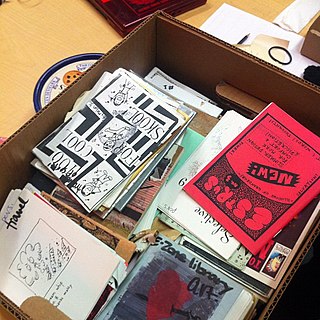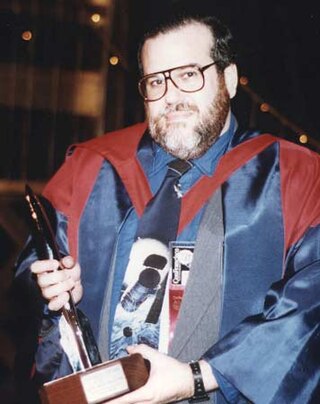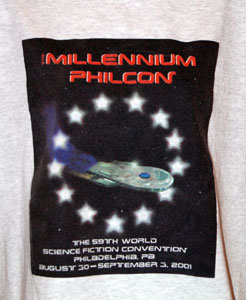
A fanzine is a non-professional and non-official publication produced by enthusiasts of a particular cultural phenomenon for the pleasure of others who share their interest. The term was coined in an October 1940 science fiction fanzine by Russ Chauvenet and first popularized within science fiction fandom, and from there the term was adopted by other communities.

Science fiction fandom or SF fandom is a community or fandom of people interested in science fiction in contact with one another based upon that interest. SF fandom has a life of its own, but not much in the way of formal organization.

A zine is a small-circulation self-published work of original or appropriated texts and images, usually reproduced via a copy machine. Zines are the product of either a single person or of a very small group, and are popularly photocopied into physical prints for circulation. A fanzine is a non-professional and non-official publication produced by enthusiasts of a particular cultural phenomenon for the pleasure of others who share their interest. The term was coined in an October 1940 science fiction fanzine by Russ Chauvenet and popularized within science fiction fandom, entering the Oxford English Dictionary in 1949.

Tom Reamy was an American science fiction and fantasy author and a key figure in 1960s and 1970s science fiction fandom. He died at age 42 prior to the publication of his first novel; his work is primarily dark fantasy.
File 770 is a long-running science fiction fanzine, newszine, and blog site published and administered by Mike Glyer. It has been published every year since 1978, and has won a record eight Hugo Awards for Best Fanzine, with the first win in 1984 and the latest in 2018.

Steven H Silver is an American science fiction fan and bibliographer, publisher, author, and editor. He has been nominated for the Hugo Award for Best Fan Writer twelve times and Best Fanzine eight times without winning.

Emerald City was a science fiction fanzine published in print and on the internet by Cheryl Morgan. She had assistance from Kevin Standlee and Anne Murphy. The magazine published 134 regular issues and 6 special issues between September 1995 and October/November 2006. Emerald City received several Hugo Award nominations during its run, winning once in 2004 in the Best Fanzine category.

Arthur Wilson "Bob" Tucker was an American author who became well known as a writer of mystery, action adventure, and science fiction under the name Wilson Tucker.

Patrick James Nielsen Hayden, is an American science fiction editor, fan, fanzine publisher, essayist, reviewer, anthologist, teacher and blogger. He is a World Fantasy Award and Hugo Award winner, and is an editor and the Manager of Science Fiction at Tor Books.
Locus: The Magazine of The Science Fiction & Fantasy Field, founded in 1968, is an American magazine published monthly in Oakland, California. It is the news organ and trade journal for the English-language science fiction and fantasy fields. It also publishes comprehensive listings of all new books published in the genres. The magazine also presents the annual Locus Awards. Locus Online was launched in April 1997, as a semi-autonomous web version of Locus Magazine.
Fanspeak is the slang or jargon current in science fiction and fantasy fandom, especially those terms in use among readers and writers of science fiction fanzines.
The 65th World Science Fiction Convention (Worldcon), also known as Nippon 2007, was held on 30 August–3 September 2007 at the Pacifico Yokohama Convention Center and adjoining hotels in Yokohama, Japan.
The 66th World Science Fiction Convention (Worldcon), also known as Denvention 3, was held on 6–10 August 2008 at the Colorado Convention Center and the Sheraton Denver Downtown Hotel in Denver, Colorado, United States.

Andrew Ian Porter is an American editor, publisher and active science fiction fan.

The 59th World Science Fiction Convention (Worldcon), also known as The Millennium Philcon, was held on 30 August–3 September 2001 at the Pennsylvania Convention Center and Philadelphia Marriott Hotel in Philadelphia, Pennsylvania, United States.
The 42nd World Science Fiction Convention (Worldcon), also known as L.A.con II, was held on 30 August–3 September 1984 at the Anaheim Hilton and the Anaheim Convention Center in Anaheim, California, United States.

Susan Joan Wood was a Canadian literary critic, professor, author and science fiction fan and editor. She was born in Ottawa, Ontario.

Richard H. E. Smith II is a Chicago, Illinois- and Milwaukee, Wisconsin-based software engineer, computer consultant and a science fiction fanzine publisher.
The role of women in speculative fiction has changed a great deal since the early to mid-20th century. There are several aspects to women's roles, including their participation as authors of speculative fiction and their role in science fiction fandom. Regarding authorship, in 1948, 10–15% of science fiction writers were female. Women's role in speculative fiction has grown since then, and in 1999, women comprised 36% of the Science Fiction and Fantasy Writers of America's professional members. Frankenstein (1818) by Mary Shelley has been called the first science fiction novel, although women wrote utopian novels even before that, with Margaret Cavendish publishing the first in the seventeenth century. Early published fantasy was written by and for any gender. However, speculative fiction, with science fiction in particular, has traditionally been viewed as a male-oriented genre.
The Ditmar Award has been awarded annually since 1969 at the Australian National Science Fiction Convention to recognise achievement in Australian science fiction and science fiction fandom. The award is similar to the Hugo Award but on a national rather than international scale.












